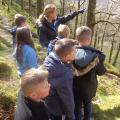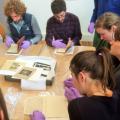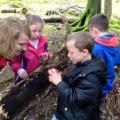News topics
Monthly Newsletters
// //// //// Online Booking //
// //// // // // // // //
For group bookings please contact
017687 77246 or
contact@derwentwater.org
Mary Pritchard, April 2019.
April 2015

Over the last month we have enjoyed visits from old staff, new school groups, an American university, and two errant ducks. We would like more visitors though! If you are free between 25th and 28th June then please come and join us for for the simple things that make midsummer so special: soft evening light on the fells, refreshing dips in the lake, and relaxing teas on the terrace.

In the middle of April 14 students from Whitworth University (USA) visited us for the Lake District stage of their 3 month study abroad programme, exploring the history and culture of Britain and Ireland.
Their grand tour started in February in Ireland, and they are being joined by different Whitworth professors along the way, dividing the programme into themed stages.
We helped the group design their Lake District itinerary, focusing on English Literature and travel writing, and we started it all off with a guided walk to Keswick Museum, exploring different responses to the landscape along the way.
Once at Keswick Museum, the group enjoyed a customised focus session on writer Robert Southey. Southey lived at Greta Hall in Keswick from 1803 until his death in 1843, and a lot of his work is stored in the museum. However, his work is rarely seen, and the museum curator, Sue Mackay, did a great job of introducing the students to the full scope of his work. The texts that Sue brought out of the archive included a travel journal, a draft biography of Sir Walter Raleigh, a manuscript of the epic poem ‘Madoc’, a collection of reviews, a general notebook covering a wide range of topics, and a play about Wat Tyler, demonstrating the enormous breadth of Southey's work.
The itinerary also included a tour and Wordsworth seminar at Dove Cottage (Wordsworth Trust), a seminar with Whitworth Professor John Pell, and plenty of free time to explore, read, and write.
With such a great group of interested students and keen writers, there will be an abundance of blogs and journal extracts to share with you on our website next month.
On Monday 27th April 45 Year 4 pupils from Crook Primary School (County Durham) came to stay for a one-night 360u00b0 Education + Adventure residential.
The purpose of their visit was to learn about the Vikings who settled in the north of England over 1000 years ago, but we looked at lots of other things along the way. Who can ignore red squirrels, Jays, Spotted woodpeckers, and fell runners when they come to play?!
Our Education Officer, Katy Moore, worked with John and Sarah Platt of Plattyplus to deliver a really exciting two-day programme, and the following summary is just a taster of the adventure, minus the singing, splashes, and secret hiding places along the way.
On the first day we prepared to go back in time, adopting Viking names, and looking at the sailing routes from Norway and Ireland to Cumbria. Proudly wearing our name necklaces, we walked from the hostel to Lodore, where half of the group stayed to do Viking activities with Plattyplus.
The other half carried on walking with Katy, exploring the woodland around the Lodore Falls. We scrambled down to the edge of the falls, and found a wonderful mass of exposed tree roots, forming the perfect theatre for a Viking saga. With great improvisation from the pupils we told the story of King Heidrek the Wise, and when we got to the bit about riddles and rhymes, we wrote down some riddles and prepared to hide them for the next group to find.
Then we walked up a steep and rocky zig zag path to Surprise View, where we could look down on Lodore and see the other group rowing the Viking boat! The pupils were so enthusiastic, and it was really rewarding to hear them take so much interest in the landscape and its history: one boy said that he usually finds walking tiring, but that he felt full of energy and excitement on our route. It was wonderful to hear everyone voluntarily acknowledge the amazing views and talk about their enjoyment of the day.
Once we were back in the hostel grounds the pupils hid the riddles, running all over the woodland, and the other group came back safely from their exciting afternoon with Plattyplus. We all wrote our names in runes, learning the different meanings of the names, runes, and local place names, and then, after tea, we connected our activities with pupils from other parts of the world. Crook Primary School is linked to 5 different schools in Africa (Namibia, Mozambique, Tanzania, Botswana, and Zimbabwe), and so we discussed what we could share and ask those pupils in connection with our trip. Back at school, the pupils will write hostel postcards to their African peers, and some of the great questions were: ‘Do you go on school trips?’, ‘Do you learn about people who lived in your area 1000 years ago?’, and ‘Do you tell riddles?’
On the second day the groups swopped activities, and the walking group did a great job of finding (and answering!) all the riddles. Despite the threat of sleet, and overnight snow on the high fells, we were lucky with the weather, and we had a great time exploring Ashness Beck and admiring the views from Falcon Crag. Lots of the pupils wanted to stay for longer and do more walking (wonderful things to hear!) but hopefully their enthusiasm will last as long as the hills, and who knows who might come back as a school group leader one day?!

On Wednesday 29th April 50 Year 3 pupils from Ashfield Junior School (Workington, Cumbria) came to stay for a two-night residential, kindly subsidised by a grant from the Quarry Hill Grassroots Grant Fund.
The residential included a full day of activities in the hostel grounds, and the whole day felt like a magical merry-go-round, with five groups rotating around five different activities: Fire, Water, Wildlife, Creativity, and Drama.
The fire-making activity was led by local National Trust rangers Mark Astley and Jessie Binns, and it took place in Strutta Wood, just beyond our hydro-plant shed. Mark and Jessie helped the pupils to prepare three small fires, only using flint and wood, but they toasted marshmallows rather than insects! Both the pupils and teachers were fascinated by the simplicity and satisfaction of the activity.
To investigate the watery aspects of Barrow House, the pupils walked up our waterfall path, learning about its history along the way. They also went over the stone bridge which crosses Barrow Beck, finding the hydro-turbine shed and a great view of Barrow Cascade. Then they made twig view finders, and they used these to sketch a view of the waterfall, with descriptive words around the side.
The wildlife activity was led by Andrea Meanwell from the Cumbria Wildlife Trust. The pupils started by dressing up as a tree, exploring the life that trees support, and then they discussed the special features of the temperate Borrowdale rainforest, looking at the ecology of our valley. This prepared them for a good investigation of the grounds, going out on a mini-beast hunt around the Highclose Coppice area.
The next activity encouraged creativity with raw materials, making pouches out of hessian (fibres from the jute plant), wool, and twig ‘needles’. The pupils were absolutely absorbed by this activity, sewing their pouches in deep concentration. Then they used the pouches to collect twigs, leaves, and other bits and bobs from the grounds, writing descriptions to accompany them, and turning these into acrostic poems. They also decorated the pouches with ink, leaves, and flowers.
Bringing lots of these elements together, the fifth activity used different areas of the grounds to stage an improvised drama, re-enacting the formation of Borrowdale, the arrival of the Vikings, and the building of Barrow House for Joseph Pocklington. The pupils enthusiastically became lots of different characters, and it was great to use the big tree trunk (recently felled and brought to the ground) as a Viking boat
Everyone really enjoyed the water, wildlife, fire, creativity, and drama of the day, and it was great to work with other local organisations. It was particularly rewarding to see the Ashfield pupils embrace the activities so enthusiastically, and they certainly explored our grounds and history very thoroughly!
In the first week of April, 8 students from Sherborne School (Dorset) completed their Duke of Edinburgh Gold Award Practice Expedition, in preparation for their final assessment expedition in Snowdonia in August.
Their week in the Lake District prepared them for snow, gales, hail storms, steep hills, scrambles, and torrential rain, but hopefully they will encounter milder weather in August.
The students were in two groups, following slightly different routes, but they all camped in the same locations: Buttermere, Keswick (fish and chips allowed on that night!), and Threlkeld.
The students were enthusiastic about their experiences so far, despite the extreme weather they encountered on the first two days of their Lake District adventure. One group, accompanied by a Mountain Leader instructor, completed a Grade 1 scramble in a hailstorm, while the other group waded across a bog to reach the summit of Blencathra (they thought it would be more interesting than the drier ridge routes!). And they almost lost their map down a snow-filled gully! However, despite all this, the students did not even break an egg: yes, one boy successfully carried 6 eggs throughout the expedition, cooking a couple each day. Instant noodles are the normal indestructible expedition fodder, but eggs and sauces in glass jars were the unusual choices for Sherborne!
After 3 nights of camping and 4 days of walking, the students spent their last night in the comfort of the hostel, and when I went over to chat to them they were gathered over maps of Snowdonia, planning their next expedition. The groups will carry out a project on their final expedition: one group has chosen to focus on different forms of energy, while the other group will write and research poetry in the area. The expedition will also include a night of wild camping, away from the services of a settlement or campsite. Good luck to them all!




